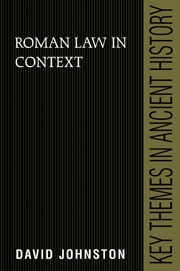5 - Commerce
Summary
This chapter deals with the main legal issues which arise in connexion with Roman commerce: contract in general; the main commercial contracts: sale, contracts of loan and for security; contracts for services, such as carriage of goods and building contracts. It then moves on to deal with how Roman businesses may have been organized: what sort of labour they used; and how they attempted to limit their liability. It concludes with the la w of insolvency.
CONTRACTS FORMAL AND INFORMAL
Contracts in Roman law can be divided into two main categories, formal and informal. First, there was the formal contract of stipulatio, which was made orally, not in writing. It was concluded by question and answer, which had to be in formal terms and had to correspond with one another. The promisee (or stipulator) would ask, for example, ‘do you promise to pay 1,000 sesterces?’, and the promisor must reply ‘I promise to pay 1,000 sesterces.’ The exact correspondence between question and answer created an obligation binding on the promisor; but, if the two did not correspond exactly, no obligation came into being. There is much to be said for this insistence on exact correspondence, since it leaves it absolutely clear which verbal exchanges create binding obligations and which do not. The high classical jurists tolerated no discrepancy between question and answer; later this came to be watered down, so that a request for 1,000 sesterces and a promise for 500 sesterces might be held good for the lesser amount, on the basis that the lesser was included within the greater.
- Type
- Chapter
- Information
- Roman Law in Context , pp. 77 - 111Publisher: Cambridge University PressPrint publication year: 1999

